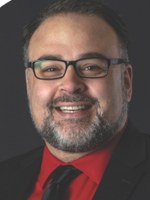School of Music Wilson Wyatt Alumni Awards Honoree 2024
 The School of Music is proud to present the Wilson Wyatt Alumni Awards Honoree of 2024, J. Daniel Jenkins. He received his master’s degree from the UofL School of Music, followed by PhD studies at the Eastman School of Music in Rochester, NY. Danny, as his friends call him, vividly recalls his early piano studies at the age of seven, being fascinated by symbols like C7and Dm that were placed above the melodies on the music staff. “I asked my teacher how does the composer know what chords to use? I guess I was a music theorist from a young age, exploring how music comes together.” Danny recalls completing his undergraduate degree, returning to his hometown of Radcliff to teach band, and discovering his teacher’s children were in the band.
The School of Music is proud to present the Wilson Wyatt Alumni Awards Honoree of 2024, J. Daniel Jenkins. He received his master’s degree from the UofL School of Music, followed by PhD studies at the Eastman School of Music in Rochester, NY. Danny, as his friends call him, vividly recalls his early piano studies at the age of seven, being fascinated by symbols like C7and Dm that were placed above the melodies on the music staff. “I asked my teacher how does the composer know what chords to use? I guess I was a music theorist from a young age, exploring how music comes together.” Danny recalls completing his undergraduate degree, returning to his hometown of Radcliff to teach band, and discovering his teacher’s children were in the band.
What brought you to the UofL? “I was a sophomore undergraduate when I started thinking I’d like to be a theory professor. I needed to pursue a master’s degree to continue teaching, and after much investigating, discovered the School of Music at the time offered a unique master’s degree in theory and composition, which satisfied both my passions. Meeting Professor Fred Speck, who was both a conductor and composer, confirmed my intention. I was amazed at the amount of financial assistance I received as a graduate student, which was very supportive. My first composition professor was Marc Satterwhite, who made me keep a listening journal. He told me I needed to listen to a new piece of music every week and write about it. Sometimes he assigned it, other times he would see something in what I was writing, saying ‘You’re kind of heading in this direction, go listen to this,’ or ‘You’re missing something here, go listen to this composer.’ I would sit in the music library for hours listening to Webern with a highlighter identifying every row, where retrograde was… Marc knew to how to look at what I was composing and expand my musical language. I don’t think there would have been as many schools that were as nurturing and supportive as Louisville.”
This fall, Dr. Jenkins begins his eighteenth year at the University of South Carolina, where he is currently Professor and Associate Dean. “As a professor I’ve had an opportunity to reach many students, but as an administrator you’re able to influence systemic change. This is such an exciting time for music study, the kinds of questions we are asking our students over the past ten years are affecting significant positive change.”
You’re recognized as a leader in the field of public music theory. What does this mean?
“My interest in public music theory began when I was researching my first book on the music of Arnold Schoenberg. What struck me were Schoenberg’s extensive program notes and radio lectures. Schoenberg was one of the first to transfer program notes to record jackets. He was so visionary that he insisted that Columbia Records include the miniature score for Pierrot Lunaire with his LP’s, which was inspired by a trend for Viennese audiences at the time to bring a musical score to follow along with during concerts. I began thinking how does this intersect with how the public thinks of music.
I explore using musical knowledge to try to make interventions in society (applied music theory). Some of our great models of public music theorists, like Bernstein, are wonderful models, but built on the idea that the public ‘needs’ to be taught about music. What I’ve tried to embrace is not seeing the public as an ‘empty vessel,’ but through living in this world we all develop some knowledge of music, meeting them where they are and asking what they would like to know more about. Today there are YouTube music theorists who have millions of followers.”
Prior to the pandemic, Danny taught music theory in a correctional facility in South Carolina. “I started a project where my students at the University of South Carolina and members of the facility wrote songs together and then visited the facility to perform together. There’s much more we are all gaining from learning about genres of music we are less familiar with. There was this amazing experience during an early teleconference where we had each performed our works, and then later that day I received a message from one of the inmates that he thought a piece by one of the USC students and another piece by one of the inmates sounded similar and he wrote out the two pieces in counterpoint (he had perfect pitch). I’ve also worked with the Lourie Center for senior citizens to build a concert around their memories. A group of my students interviewed the seniors, pulled out questions, there was a recording team, then all of us picked a song to complement each person’s interview, then presented the works in concert with the videos interspersed. It was a wonderful way to have the residents experience a deeper account of their memories.”
Dr. J. Daniel Jenkins will be honored at the annual Alumni Awards dinner in October.
